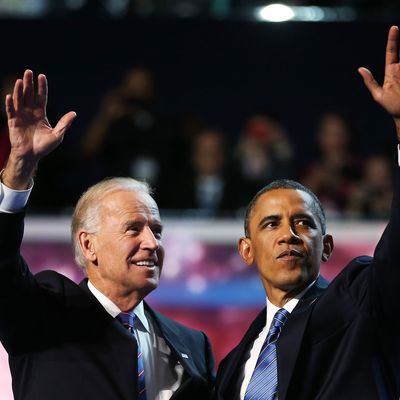
It’s not exactly a secret that the central message of Joe Biden’s presidential candidacy is that voters should choose him just like Barack Obama did. This new campaign ad makes that unsubtly clear:
What makes this effort to make his vice-presidential selection an implicit presidential endorsement particularly egregious (implicit because Obama has not backed him, and has no plans to do so unless he wins the nomination) is the evidence we have that the 44th president went out of his way not to set up some sort of succession, as the New York Times reported when Biden was chosen:
The choice by Mr. Obama in some ways mirrors the choice by Mr. Bush of Dick Cheney as his running mate in 2000; at his age, it appears unlikely that Mr. Biden would be in a position to run for president should Mr. Obama win and serve two terms. Shorn of any remaining ambition to run for president on his own, he could find himself in a less complex political relationship with Mr. Obama than most vice presidents have with their presidents.
As I noted earlier this year, this all-but-forgotten data point about the Obama-Biden relationship really does explain a lot:
Team Obama was looking at Biden strictly as a veep, and perhaps as someone who could help out with congressional relations and international matters — but not as any sort of heir apparent or successor as leader and shaper of the Democratic Party. The assumption that Biden would be too old to run for president in 2016 is rather interesting now that he’s running four years later. But it does help explain why there was little apparent worry over Biden’s touchy history on racial issues. The Obama–Biden ticket had more than enough biracial bona fides to cover a multitude of old sins and associations.
With the perspective of time, though, perhaps Obama’s decision not to push his party to accept an heir apparent of his choice was a mistake. Without the long shadow of a president who was and remains very popular among Democrats, the Donkey Party endured a bitter primary fight in 2016 that in turn contributed to an infinitely regrettable general-election defeat. And now Democrats are dealing with the largest presidential field in the history of American politics, with an arguably shaky soon-to-be-octogenarian front-runner who would not even be in the race if not for his Obama connection.
Putting aside the original running-mate decision in 2008 on grounds that candidate Obama had bigger fish to fry and had no intention of guaranteeing Joe Biden a ticket to the White House, should Obama have reconsidered this decision in 2012 and gone ahead and designated an heir apparent for real? By then he and his people probably knew that even if they thought Biden would be too old to run in 2016 (or later), he sure didn’t. And they could have saved Democrats a world of grief by eliminating a serious primary battle in 2016 and in 2020.
The identity of a 2012 Biden substitute, of course, could have been problematic. The obvious replacement would have been then-secretary of State Hillary Clinton, a choice that would have made history. But if Obama recognized the need to turn the page on the Clinton legacy that he had himself done a lot to relegate to the history books in 2008, he might have chosen a younger and less controversial running mate — perhaps even one who could have helped him in that tough 2012 general election more than Joe Biden did.
That didn’t happen, of course. Veep-dumping was pretty common in the 19th century for presidents who ran for a second term, but even though it is almost constantly discussed as a possibility (viz. the current talk of replacing Mike Pence with Nikki Haley in 2020, which she repudiated earlier this week), it hasn’t actually occurred since FDR’s fateful decision to replace Henry Wallace with Harry Truman in 1944 (perhaps the most consequential act of ticket-scrambling since Abraham Lincoln replaced Hannibal Hamlin with Andrew Johnson in 1864). But perhaps presidents should consider it more often: Dwight D. Eisenhower reportedly tried to get Richard Nixon to give up the vice-presidency in 1956 and accept a Cabinet appointment instead. Had Ike pushed the Tricky One out of the veep job, it might have saved Americans a world of trouble. And if Obama had changed things up in 2012, he might have helped his party overcome the well-worn appearance of Democrats in disarray.






























